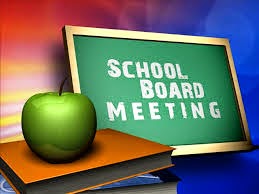I have been a politician for 27 years. Part-time to be sure. A limited sphere of influence. Nevertheless, I am an elected official who has successfully run for office ten times. I am a school trustee (or as most American states call it, a school board member).
Ours is a good sized board of education. Our operating budget approaches $200 million dollars and exceeds that of the city administration. We are the biggest employer in a community of 140,000 with some 2,000 employees spread over 50 schools and district buildings. 19,000 school-aged children are entrusted to our care daily by their families.
Much of what we do as a board of education is pretty straightforward. We hire excellent people to manage the district and hold them accountable for results. We have the responsibility to live within our means financially. [We are not allowed to run a deficit without the prior consent of the provincial Ministry of Education, and such permission would be highly unlikely.] We promote public education in a community where approximately 15% of school-aged children attend independent (largely faith-based) schools. We liaise with many groups with an interest in what happens in the schools, such as the local university, employers, the teachers' and staff unions, social service agencies, service clubs, advocacy groups, and the police. Perhaps most importantly, we participate in the development of a long-term strategic plan and ensure that it is enfolded into the warp and woof of the school district's activities.
A good deal of the politics has been removed from our job as a trustee. We no longer set the local school tax rate. This is done provincially. Similarly, teacher collective agreement bargaining takes place at the provincial level. In addition, a good deal of the budget which we receive from the Ministry of Education is targeted to specific programs, thus eliminating much of the spending discretion we once had.
That is not to say that political decisions don't have to be made. Whenever resources are scarce--and they always are--one group has to be favoured over another. And no matter what choice we make, the loser accuses us of bias, even injustice. No matter how much good one wants to do as a politician, one simply can't meet all the needs, however meritorious.
[That's why I always tell wide-eyed, naive, would-be candidates to political office my two axioms for being an elected official:
Out of these experiences I have come to certain conclusions about functioning as a person of faith in a non-sectarian setting such as a public school board. I'll discuss those in my next couple of posts.
Ours is a good sized board of education. Our operating budget approaches $200 million dollars and exceeds that of the city administration. We are the biggest employer in a community of 140,000 with some 2,000 employees spread over 50 schools and district buildings. 19,000 school-aged children are entrusted to our care daily by their families.
Much of what we do as a board of education is pretty straightforward. We hire excellent people to manage the district and hold them accountable for results. We have the responsibility to live within our means financially. [We are not allowed to run a deficit without the prior consent of the provincial Ministry of Education, and such permission would be highly unlikely.] We promote public education in a community where approximately 15% of school-aged children attend independent (largely faith-based) schools. We liaise with many groups with an interest in what happens in the schools, such as the local university, employers, the teachers' and staff unions, social service agencies, service clubs, advocacy groups, and the police. Perhaps most importantly, we participate in the development of a long-term strategic plan and ensure that it is enfolded into the warp and woof of the school district's activities.
A good deal of the politics has been removed from our job as a trustee. We no longer set the local school tax rate. This is done provincially. Similarly, teacher collective agreement bargaining takes place at the provincial level. In addition, a good deal of the budget which we receive from the Ministry of Education is targeted to specific programs, thus eliminating much of the spending discretion we once had.
That is not to say that political decisions don't have to be made. Whenever resources are scarce--and they always are--one group has to be favoured over another. And no matter what choice we make, the loser accuses us of bias, even injustice. No matter how much good one wants to do as a politician, one simply can't meet all the needs, however meritorious.
[That's why I always tell wide-eyed, naive, would-be candidates to political office my two axioms for being an elected official:
- You can't please everyone no matter how much you want to. So if you don't have a thick skin, don't go into politics.
- Never take criticism personally, no matter how personally it might be delivered. Those who know you, know better. Those who don't will lash out at the nearest available politician. It's just part of the reality of political life.]
Out of these experiences I have come to certain conclusions about functioning as a person of faith in a non-sectarian setting such as a public school board. I'll discuss those in my next couple of posts.



